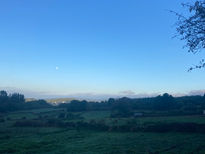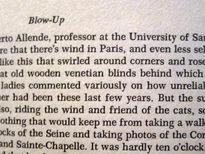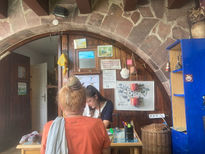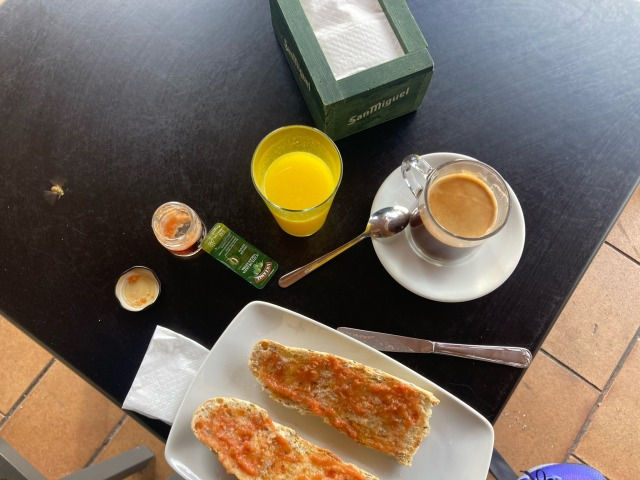- Sep 16, 2022
- 4 min read
The next morning I’m awakened by the usual rustling of bags and zipping of zippers. Outside, I can hear the coffee machine whirring, cutlery clanking, excited voices sharing plans for the kilometres ahead. I take my time getting up, although the absence of Gertrude in the bunk beside me gives me some alarm. How is she up this early? Somewhere outside I can hear her husky voice, her smoker’s laugh, her cough.
I have my yogurt and granola outside, feeling like a Total Breakfast Queen next to the suckers who bought the hostel’s €5 ziploc bags of bread, jam, gummy apples. Gertrude appears and asks if I’d like to start the day walking with her. Reassured by her insistence that we can abandon each other at any moment, no explanation needed (told ya we had a connection), I agree. I finish my coffee, stroke some cats, and slowly get my things in order. Which is when I realise: Gertrude is a chaotic packer. Her things are strewn all over the living room, and she’s chatting away happily to passers-by with no plans, seemingly, on getting her stuff into, as she calls it, her “hammersack.” It’s half past eight. Only her, me and the Italian remain at the hostel.
This explains a lot of the connection. I fucking hate packing. It gives me anxiety every time. Which is another way the Camino has already been helpful – as I have to pack up every morning, I’ve started getting good at it. I know where each thing goes. Zip, zap, done! And yet, every morning, I feel like it’s a small miracle when my backpack finally closes and shrinks to a manageable size beneath the straps. What can I say, it’s been good to me.
G-Boz clearly has not arrived at this stage yet, so I head out to the terrace where I continue plotting the novel as I wait. About twenty minutes later she comes out, smokes a cigarette and starts looking at the route ahead. I finally tell her we cannot plan any more than we have (Me! Telling people to plan less!) and we set off, with the Italian joining us.
I’m excited to get G’s story and it is great. The chat is great. Her personality is great. But her walking is wayyyy slower than me and Italian Girl. By eleven, when I’m normally 15k deep, we’ve only walked seven. So I take G’s number, wish her the best and set off with the Italian girl, who we can now call Lucia.

We have a good time. We walk and chat. We overtake everyone who passed us that morning. We stop for lunch on a hill overlooking the sea. We laugh. It’s nice. But about a kilometre into the final descent into Markina I feel the need for solitude, so I set off again, saying I’ll wait for her in Merkina so we can walk the remaining 7k to the monastery together.
Well, by the time I reach Merkina, my feet are telling me to forget about it. I’ve had to walk the last 5k in scorching heat without any water, and I am knackered. I find a beautiful albergue with a garden full of flowers and vegetables, and luck out – though they’re fully booked, they’ve just had a cancellation. Better yet, Cute French Guy and his maman are here, too. I text Lucia that she should try her luck, and she, too, manages to get a bed.
Partly because my feet are too beat to walk back to the supermarket in town but mainly because I heard Cute French Guy and his maman are doing the dinner, I ask about the menu. It’s definitely an indulgence to eat a pilgrim’s menu two nights in a row, but when I hear there’s going to be pasta AND chicken it’s not even really a choice anymore. I go for the breakfast, too, cause there is no way in hell I’m walking back into town now.

Until dinner, I do some yoga in the garden and look at my next steps. Guernika seems to be a cause for alarm, as the albergue is shut, and alternative lodging starts at €120 a night. Wtf!? Where was this warning during my Camino Forum glory days?
At dinner, we discuss best ways to get to Gernika. It’s confusing. It seems like we may have to take a bus in order to bypass it and reach the next affordable hostel. So much for the Picasso pilgrimage.

After dinner we finish the wine while looking at the full moon from the garden. G offers me a job. She says I can live in her house. She wants me to meet her spiritual teacher and the manager of the art show she works for and lots of people from what might or might not be a shamanic cult. These all sound like very cool things but it’s only week one and I don’t want to make any decisions. Still, it’s a seed of an idea. Is running shamanic women’s circles in Austria my next step? She shows me photos of the house. There’s a lush garden, space for meditation, Buddha statuettes. Psychedelic mushrooms grow in the grass. They have a sweat lodge.
I always wanted a sweat lodge.










































































































